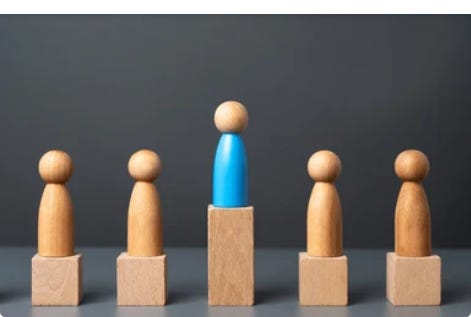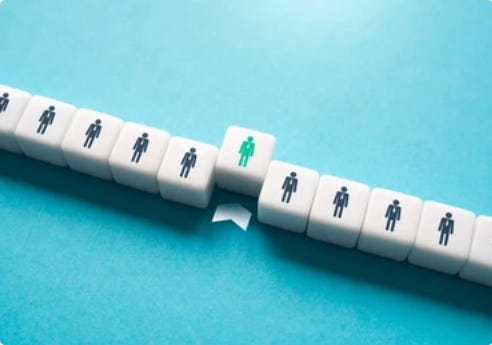In today's vernacular, “responsibility of privilege” refers to the idea that individuals or groups who have advantages or benefits in society have a corresponding duty to use those advantages responsibly and for the greater good.
In other words, if you have, through diligent application of thought and planning in the decisions that direct the path of your life to a path that leads to success you are responsible to make life better for those who did not choose the same path and instead chose to “live for the moment.”
Of course we disagree. In our opinion, the modern definition of “responsibility of privilege” (RoP) is the same misguided thinking that demands successful people “pay their fair share” when they already pay more than a fair share. The current definition leans to the government being the arbiter of what you must do to make amends for having been successful, and we can’t abide that.
We support, in fact we demand, that all men be treated as if they’re equal because they are! Created equal means that you have the same options to better yourself, to educate yourself, to take advantage of the God given rights that all US citizens are born with. It does not entitle you to any special privilege at all. The lottery of who your parents are, gender, ethnicity, or place of birth are just that, a lottery. What you make of yourself, by yourself, is what counts.
So each of us is responsible to make of ourselves what we will, on our own, with no special cases allowed, because (add your favorite social handicap here).
We know there are some of us who cannot thrive, or possible even survive, on their own. For these people we are completely in favor of the government safety net, although we prefer non-government solutions where possible.
As presently defined, RoP has some key aspects:
You must recognize your privilege and its systematic origin
You must take responsibility for how your privilege impacts others
You must learn about social issues and how your privilege impacts others
You must use your privilege to advocate for equity and support marginalized communities.
You must utilize your privileged access to resources, networks, or opportunities to benefit others.
You must work to dismantle unfair structures that perpetuate inequality.
We find this list to be less about the responsibility of privilege than it is about the woke concept of equity. They assume each of those who attained success did so under less than honest circumstances – you were accepted in that school because … – and not because you did well enough to get in. Please remember we’re talking in this case of your performance, not the woke irregularities of how businesses or schools treat individuals.
The concept of RoP emphasizes that privilege comes with an ethical obligation to contribute positively to society and work towards greater equality. It's about using advantages constructively rather than feeling guilty about them.
The relationship between equity and the responsibility of privilege is closely intertwined in the modern definition, and again, this definition may support the woke agenda, however it is counterintuitive to honest pursuit of success by the individual.
If we use our advantages constructively to change those institutions that do not treat equally with all people there is no reason to demand equity of outcome. The outcome each of us achieves will be gauged by our ability and not by the decisions of some government appendage responsible for equity.
What we call RoP today was known in the past. It had different names, however the function and results were what we also look for today. In the 1800s related ideas about social responsibility among the privileged classes did exist, albeit in different forms and contexts. Some of the terms used to describe the 19th century ideas of RoP are listed below. Our comments are in italics:
Noblesse Oblige, the French phrase, meaning "nobility obligates," was perhaps the closest equivalent. It suggested that nobility and those of high social rank had a responsibility to behave honorably and generously towards those of lower status. You’ll note that the privileged were not required to support marginalized communities, just to be responsible and act generously towards them.
Christian Duty: Many privileged individuals, particularly in Protestant societies, viewed charitable works as a religious obligation. This was often framed in terms of Christian stewardship and helping the less fortunate. Charitable works is a private decision, not a government mandate, and as such is to be applauded. In our opinion the government has tried to take over the administration of “charity” and has, by doing so, placed themselves as the giver of gifts, a position no government can afford to be in for very long. The costs for the government playing Santa Claus has destroyed more than one country.
Philanthropy: The 19th century saw the rise of organized philanthropy among wealthy industrialists and businessmen. While not exactly the same as modern concepts of privilege, it did involve using wealth for social good. The modern concept of privilege, which we heartily disagree with, uses government in place of rich philanthropists and distributes whatever it is giving away not to those in need, but to those the government needs.
Paternalism: In some contexts, particularly in relation to colonialism and class relations, privileged groups saw themselves as having a responsibility to "civilize" or "uplift" those they considered inferior. This is one of the concepts of the old definition of RoP that has survived to the present, especially when one of those “privileged groups” is a country like the US. Wherever the US goes and for whatever reason we’re there, eventually we try to spread our version of civilization, to replace the extant social mores, and to provide the benefits of the modern world – our version of uplifting – to people who, in many cases aren’t culturally ready to wield the power that comes with participation in the modern world. Trying to implement a central government, as is the norm in the West, in Afghanistan proved impossible for both the US and for Russia. The Afghans were not ready to give up their tribal society, and no manner of effort by the enlightened outsiders was successful.
It's important to note that these 19th-century concepts often came with problematic assumptions about class, race, and social hierarchies that would be criticized in modern discussions of privilege and responsibility. Although the thought of the existence of class, race, and social standing as social separators are not an accepted part of modern society, there are still some who use these characteristics for their own benefit.
The explicit focus on systemic inequalities and the recognition of unearned advantages that characterize modern discussions of "responsibility of privilege" were generally not present in the past. This is the result of the addition of “woke” theory to the conversation. Now, not only are those who are considered privileged – the financially well-to-do mainly – thought less of if they are not actively pursuing social good, they’re being asked to “pay their fair share”, an amount that is subjective and has never been set as a hard number. For the well-to-do to pay their fair share would require the implementation of a Flat Tax or a Fair Tax, either of which would have the well-to-do paying the same percentage of earnings as everyone else. This would, mainly, lower their taxes, not raise them.
The concept of RoP as we understand it today evolved significantly through 20th-century social movements and critical theory, and does not mean what it did 150 years ago. As we believe critical theory and the social justice movements are dubious at best, we disregard the modern definition and prefer and use the old one.
We believe the Responsibility of Privilege can be summed up in one sentence.
Those who have reaped the benefit are responsible to pay it forward so that another generation can take advantage of citizenship in the greatest country on earth.
We can’t ask often enough that you contribute to a charity or organization that is taking care of the hurricane victims. The government certainly is less than aggressive in their disaster response and people still need help. We recommend Samaritan's Purse or Mercury One as already on the ground and doing excellent work. Thank you.





Kinda lines up with the old Chinese Proverb. 'If you save somebody's life, you are responsible for them forever'. I feel that way about Don Surber. He saved my life when he gave me a blog.